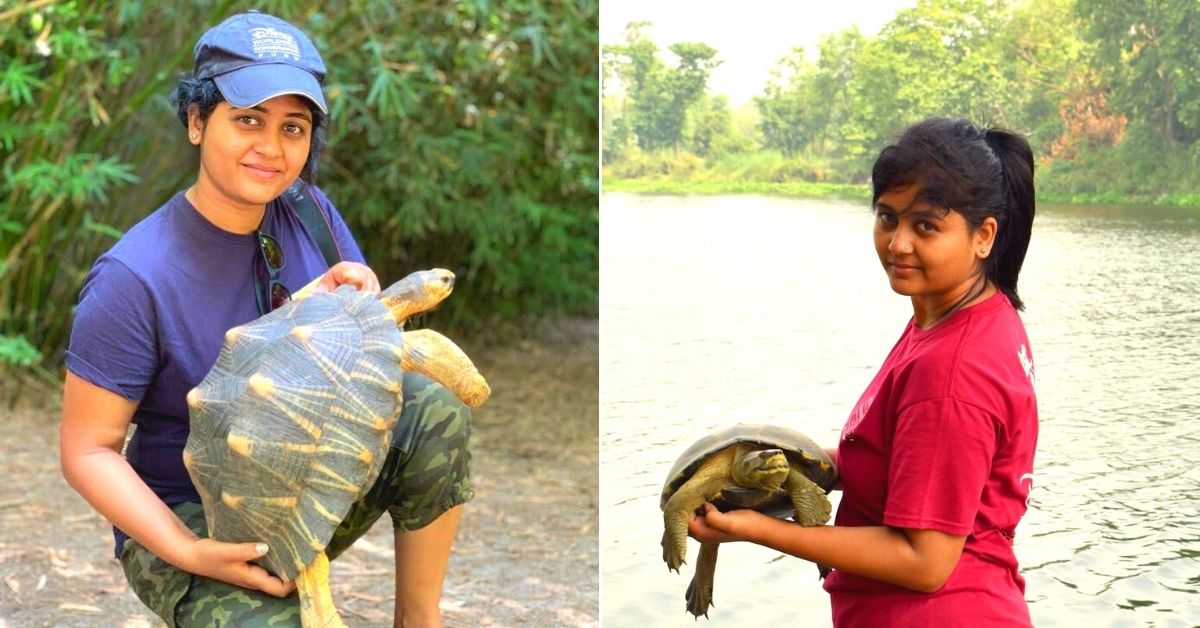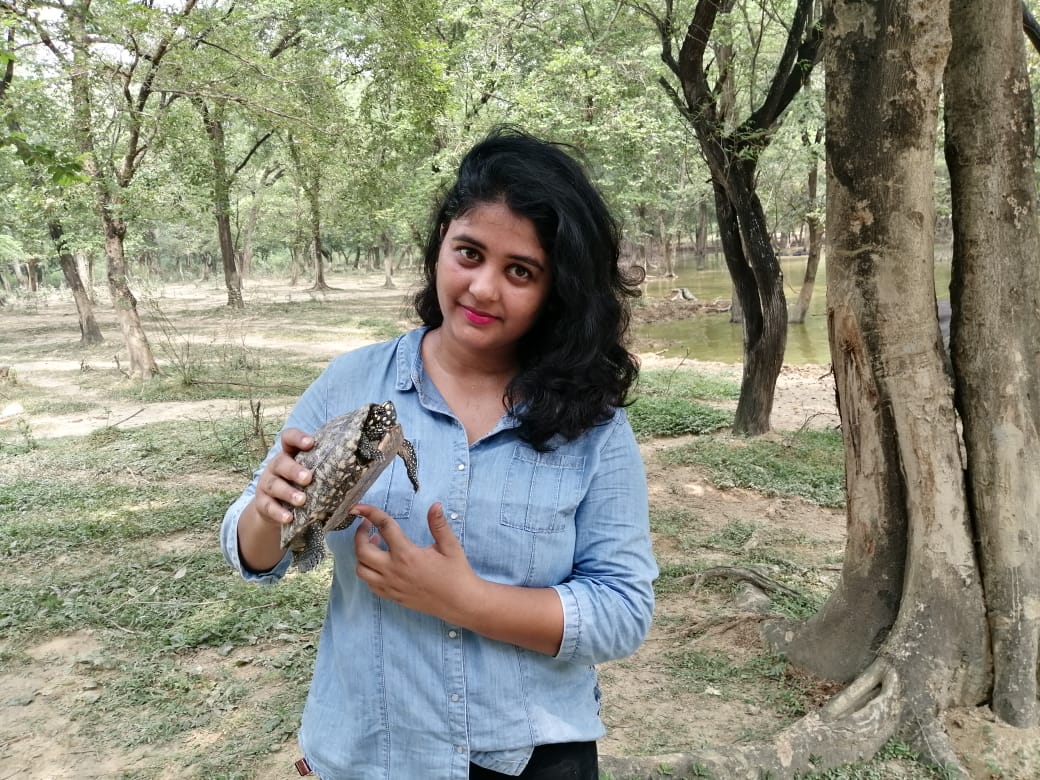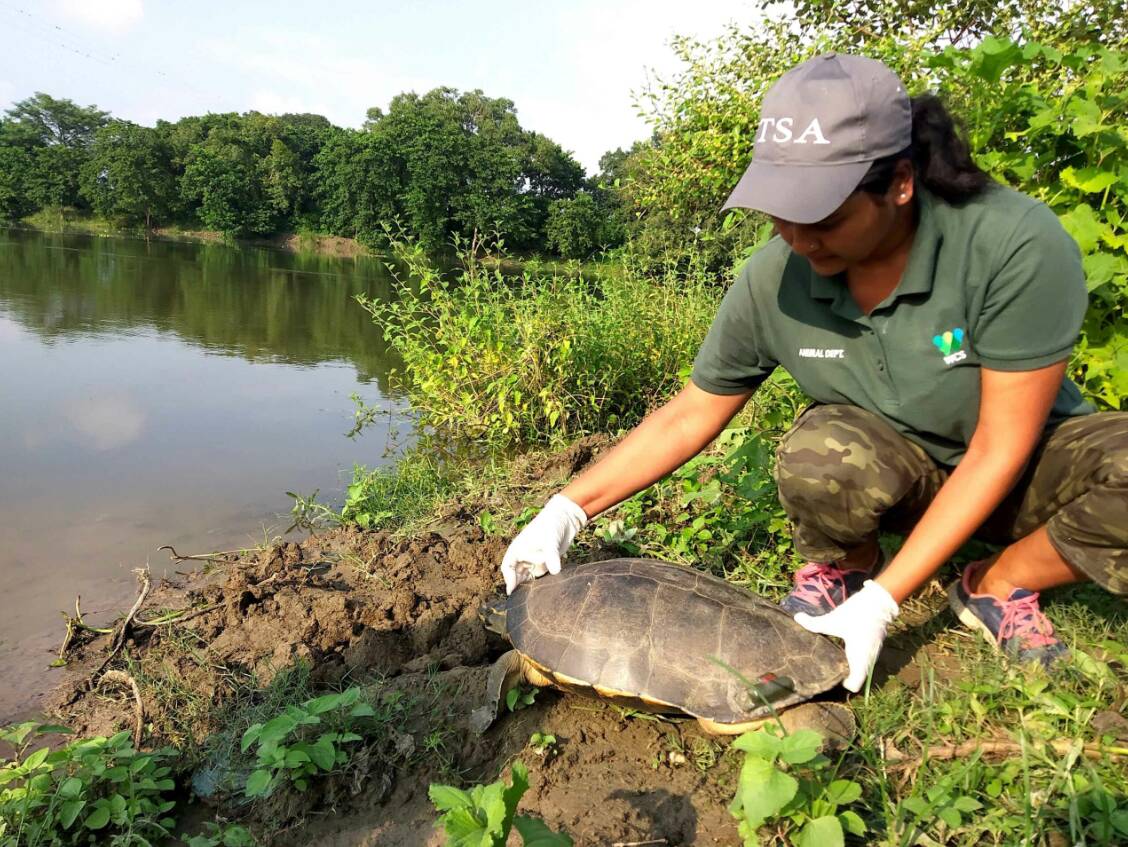1 Woman, 8 Years of Effort & 28,000 Turtles Saved: An Incredible Conservation Story
One of India's most hardworking conservationists, Arunima Singh has won the NatWest Group Earth Heroes Save the Species Award 2021 for her exemplary efforts towards saving turtles, tortoises, crocodilians and Gangetic dolphins.

In late October this year, Arunima Singh was conferred with the NatWest Group Earth Heroes Save the Species Award 2021 for her exemplary grassroots conservation efforts to safeguard north Indian freshwater turtles and tortoises, crocodilians and Gangetic river dolphins.
Since 2013, Arunima, a resident of Lucknow and staff of the Turtle Survival Alliance (TSA) – India, has used various initiatives to further the cause of conservation — from educating over 50,000 children from rural and urban communities about conserving freshwater reptiles through formal and informal means in Uttar Pradesh, to assisting with rescue, rehabilitation and release of over 28,000 turtles, 25 Gangetic dolphins, 6 marsh crocodiles and 4 gharials in the last 8 years.
In a conversation with The Better India, she recalls, “As a child I would often visit the river with my grandparents to watch and observe aquatic life. I guess without really knowing it, my passion for conservation came from the imprint those visits left in my mind. These visits growing up would help create a sense of belonging within me and establish a close connection with aquatic life.”
Over the years, Arunima’s efforts have led to many changes.
Through the joint Uttar Pradesh Forest Department and TSA India Program for Aquatic Biology, she was instrumental in establishing assurance colonies for more than 10 species of turtles and most of which are critically endangered. Her efforts further bolstered rear and release programmes for certain imperiled turtle species such as Indian Narrow-headed Softshell Turtle (Chitra indica).
Moreover she helped sensitise and built capacities of hundreds of frontline forest department staff and veterinarians. Her research has facilitated understanding the breeding of a few elusive species. If this wasn’t enough, she has also been on the frontline of operationalising on-site care for tens of thousands of turtles rescued from clandestine trade.
As Dr Shailendra Singh, the Director of TSA India Program, said upon receiving news of the award, “Arunima has been one of the most remarkable conservationists in the country, single-handedly attending to several wildlife distress calls. Her research on elusive freshwater turtle species, the Crowned River Turtle (Hardella thurjii), has provided watershed moments for scientific turtle conservation communities and aids our organization in the development of species-specific conservation strategies.”
But it was a visit to the Kukrail Gharial Rehabilitation Center (KGRC) at the start of her Master’s course in Life Science from Lucknow University in 2010 that set her on the path of conservation.
“Dr. Shailendra gave me an insight into how I could be involved with wildlife conservation in the long term and gave me opportunities to obtain a greater understanding of it in areas like the Chambal Valley. In 2011, I began doing some volunteering work with the TSA and enrolled in a small awareness and educational programme at Lucknow University for wildlife conservation. Upon completing my Master’s degree, I got involved full time in conservation work of endangered freshwater turtles, tortoises and other aquatic species. At present, I’m also pursuing a PhD focussing on freshwater turtles,” she says.
Assurance Colonies
As an intern joining the TSA in late 2013, her vision was to develop assurance colonies for all Indian turtle species under one roof. She had even obtained a small grant to work on this idea.
But what are these assurance colonies?
According to this explainer in Reptiles Cove, “Assurance colonies is a word that refers to a group of critically endangered or threatened animals in captivity. Assurance colonies are used to create various conservation programs together with breeding groups to ensure that these animals will not become extinct. In the wild, these animals have very low chances of survival, and they may only do so in an assurance colony.”
While building these assurance colonies to start with, the TSA-India programme started looking for a more in-situ approach in the selected tributaries of Ganges to safeguard turtle population.
“The first winter is crucial for the survival of newly emerged hatchlings of Chitra. Rearing them is very difficult because they stop eating. When the baby hatches, it’s imperative that it is given the necessary nourishment for survival and growth. Our project team would get eggs from the wild, and hatch here at the captive centre, but there was no full-time team there to oversee this process. When I started with TSA, the whole idea was that apart from the Chitra species, there were other freshwater turtle species with no husbandry and breeding information available. We began significantly expanding our research on other species,” Arunima explains.
She notes, “See, you can’t bring turtles from the wild, simply start a breeding programme and keep them to develop assurance colonies. Also, for any species endangered or critically endangered, there should be two or three assurance colonies for them.”
Turtle eggs are translocated to an assurance colony like at the KGRC from vulnerable nests along rivers like the Yamuna and Ghaghra. There, they are incubated safely and naturally in a sand hatchery, growing in habitats featuring solar-powered warm, running water, and fed live fish fingerlings. After being head started to a size around 1,000 gms, most juveniles are released into rivers where governments are carrying out a rejuvenation initiative. The objective of releasing these turtles back into their natural habitats will help the wild population rebound there.
Today, for species like the Red-crowned Roofed Turtle (Batagur kachuga), TSA helped create three assurance colonies including the KGRC, Lucknow and the Kanpur Zoo.
“Thus far, we have developed assurance colonies for more than 10 endangered and critically endangered species of freshwater turtles. B. kachuga is completely extinct from the Ganges and other rivers, but only survives in the Chambal. We are working on a re-introduction programme for these species in the Ganga. For species such as Chitra, we have got some rescued animals and are preparing more ground for their breeding,” she adds.
Triage Centre for Turtles
But when Arunima started working towards building assurance colonies, she also started getting more calls from the enforcement agencies about endangered species of turtles rescued and confiscated from smugglers, who would earlier simply release them back into the wild. There were no such centres to first rehabilitate these confiscated turtles.
“The first consignment we helped rehabilitate was around 300 spotted pond turtles (Geoclemys hamiltonii) near Etawah and Mainpuri in 2015. We brought them to the KGRC and cared for them for 60 days before releasing them back into the wild. However, at the time, these turtles, particularly soft-shelled ones, suffered from high mortality because of the uncaring way in which they were translocated by the poachers,” she says.
In the same year, they received another consignment of 500 smuggled Indian Tent Turtles (Pangshura tentoria circumdata) and Indian Roofed Turtles (Pangshura tecta) at the KGRC. It was during this operation, they met with Arvind Chaturvedi, a police officer with the Uttar Pradesh Special Task Force (STF) and a man Arunima describes as “very committed to wildlife conservation” as well, who helped confiscate this consignment.
The TSA gathers information on the field about endangered species being smuggled and relays that information to the police or the forest department. Couple of years later, there was another conversation Arunima and her team at TSA had with Chaturvedi, following which his STF team confiscated around a record 6,400 turtles in Amethi and nabbed the kingpin of an inter-state gang involved in smuggling of reptiles in 2017.
“At the time, I was heading the Rescue and Rehabilitation for TSA, giving shelter and treatment to turtles and then releasing them back into the wild. Treating the 6,000-odd turtles individually was difficult, but our team took care of each and every turtle like removing the hooks inside the mouth, etc. Unfortunately, we could not treat them for a prolonged period of time because we didn’t have the necessary facilities for 6,000-odd turtles at once. But we did build a small and temporary facility at Amethi, and released the animals back into the wild,” she says.
Arunima says this event was an eye opener in terms of understanding the scale of smuggling taking place and building a triage centre. From here on, the TSA began offering training to personnel of the forest department, police, and local communities across UP where consignments of these turtles were confiscated on how to approach rescue and rehabilitation.
“Since 2017, we’ve helped rescue and rehabilitate thousands of turtles every year, giving them care and releasing them back into the wild. Before our intervention, there was no rescue and rehabilitation centre for freshwater turtles in UP. There was no management plan in terms of what to do with these rescued turtles, and there was a lack of enforcement and awareness as well,” she adds.
What Can We Do?
Freshwater turtle species are smuggled for three primary reasons:
1) Food: In states like West Bengal, soft-shelled turtles are a delicacy, particularly during festivals like Durga Puja. Recently, a consignment of soft shells heading to Kolkata was confiscated by the authorities in Uttar Pradesh.
2) Medicinal Purposes: Some of these freshwater species are translocated to South-East Asia and China via Bangladesh to make traditional medicine. “For medicinal purposes, poachers often take out the calipee of big soft shelled turtles, boil it, dry it, and then package them as chips which makes it difficult for enforcement agencies to detect what’s happening. In 2019, we helped confiscate about 2-3 quintals of calipee,” says Arunima.
3) Pet trade: Given their peaceful demeanour and beautiful shells, some of these freshwater turtles are highly sought after pets, including in India.
“About a month ago, we repatriated a bunch of turtles from Hyderabad to Lucknow. The poachers were taking these turtles from the Gomti River and selling them in Hyderabad to pet shops there. The Indian tent turtles (Pangshura tentoria) are hardshell. The males are generally three to four times smaller than females. Poachers translocate the males to private aquariums since they won’t grow beyond a certain height. There are often organised gangs behind such smuggling organisations,” she adds.
How do you address these issues?
Starting out, Arunima believes that governments and NGOs working on the ground must coordinate their efforts better to help on-ground smugglers involved in poaching and translocating these turtles and finding out alternative means of improved livelihood opportunities as these on-ground smugglers often come from impoverished backgrounds.
Also, she believes enforcement organisations have to do a better job of recognising where the demand for endangered freshwater turtle species come from and understand how this business works.
“We probably need stronger laws as well, since smugglers who are arrested often get bail within a month, and go back to business. Education and awareness are also very important. We must sensitise the general public into not keeping turtles as pets. The Olive Ridley turtles are famous because of the great work NGOs and governments have done together in protecting them. There is a lack of awareness about freshwater turtles. We must get common citizens more involved in the conservation programmes like they have done with Olive Ridleys,” she says.
(Edited by Divya Sethu)
Like this story? Or have something to share? Write to us: [email protected], or connect with us on Facebook and Twitter.
This story made me
- 97
- 121
- 89
- 167
Tell Us More
We bring stories straight from the heart of India, to inspire millions and create a wave of impact. Our positive movement is growing bigger everyday, and we would love for you to join it.
Please contribute whatever you can, every little penny helps our team in bringing you more stories that support dreams and spread hope.



















